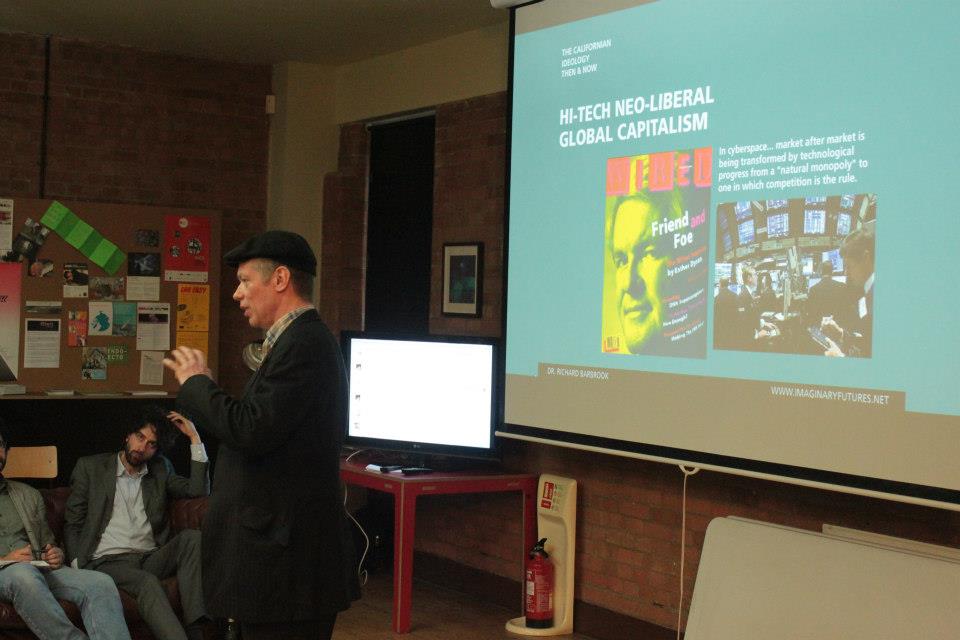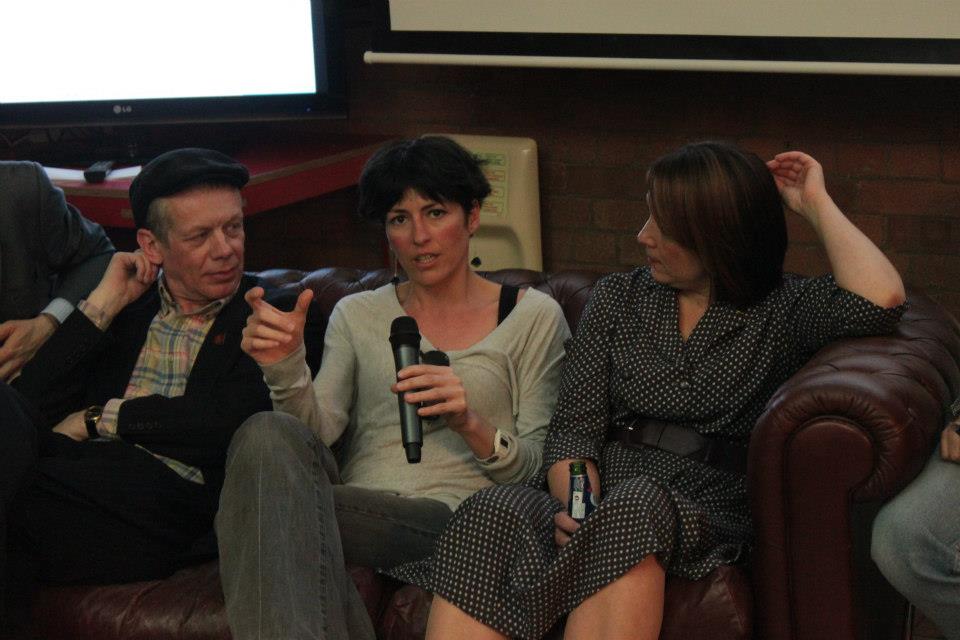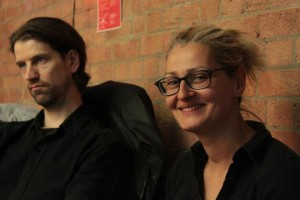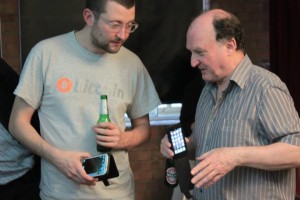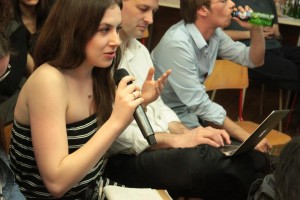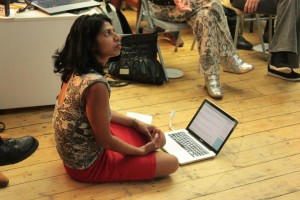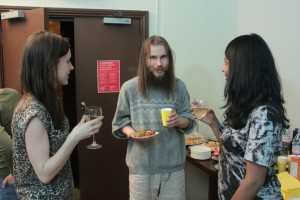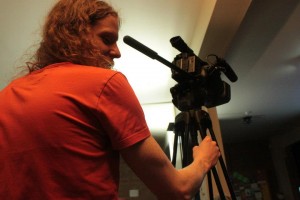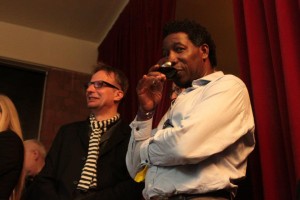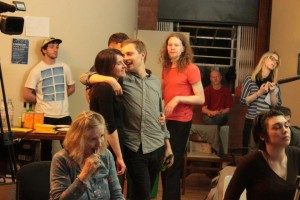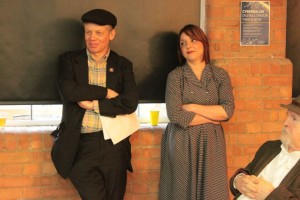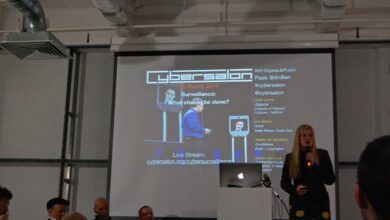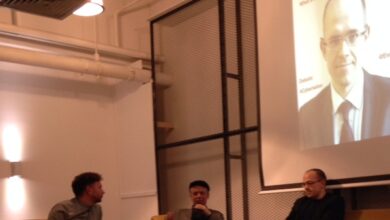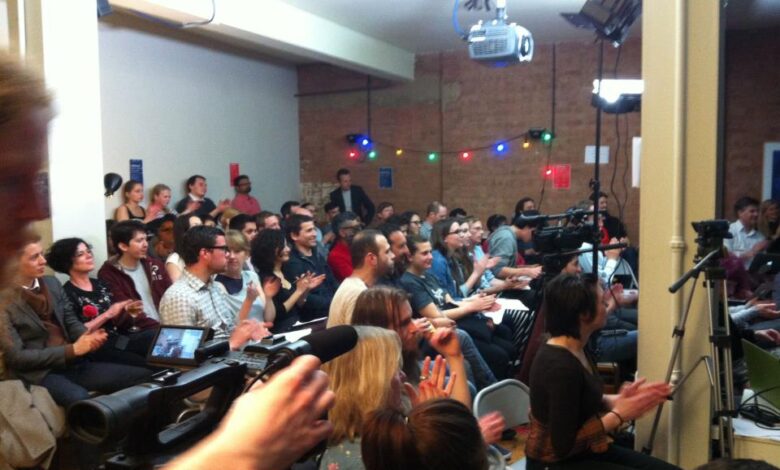
Summary: Net Politics – April 24th 2013
Part of the Then and Now Series of Talks
Bitcoin hacker speaks about financial freedom
Event Summary- by Eva Pascoe, Alexandra Reynolds & Niki Gomez
On an unusually hot and steamy April day our regular hangout Arts Catalyst (Clerkenwell, London) felt rather cool and breezy with the beers being nicely chilled in the giant kegs (Cyberpolitics is a thirsty business). Last preparations done, projector on, pizzas in the oven for the hungry Clerkenwellians and we were ready to kick-off our session on Net Politics Then and Now. To be frank, we were not sure what to expect as the original Netpolitics event was planned months before the funeral of Mrs Thatcher when all appeared very theoretical and safe. However, with the ashes barely cooling on the effigy burial in Goldthorpe, the political temperature in town seemed to have reached new proportions. But brave souls we are, after much debate we decided to face it head on and proceed. Our invitees were from very diverse backgrounds and we were quietly preparing for the evening to turn into a rally or a fist-fight (which depends on your definition of the successful political event).
Introduction by Paolo Gerbaudo – the author of Tweets and The Streets and a leading researcher on the impact of the New Media tools on the politics of protest.
The Net Politics Cybersalon is introduced in terms of the fact that digital communications technologies matter and influence politics and that in this session we will be exploring how exactly these technologies can be understood to change or influence politics. The session will also touch upon whether politics and political issues are different now, or if it is simply ‘old wine in new bottles’, ‘new wine in new bottles’ or perhaps post-politics or something entirely different altogether.
Dr Richard Barbrook – the context for the debate was framed by the leading Net critic, whose critique of Techno-Utopias in ‘The California Ideology’ with Andy Cameron in 1995 and ‘Imaginary Futures” in 2007 has initiated a more reflective attitude to the Internet, continued by Jaron Lanier and more recently by Evgeny Morozov.
“VC used to mean VietCong- now it means Venture Capital”
Barbrook’s introduction centred around the idea that we now live in an unexpectedly novel mix of neo-liberal Right and Left-wing political environment. The free spirit of the 1960’s beatniks and hippies has been taken on and used in the name of entrepreneurial and commercial spirit: techno-hippies. Steve Jobs embodied this thinking, he said, against Vietnam and pro-liberal.
Barbrook discussed the mixed economy of the Net, which was funded for the first twenty years by the US Military budget. Then, once built, was leveraged by the Venture Capital movement led from Palo Alto as a platform for commercial start-ups. This amalgamated background of today’s Net leads to ambiguity between Left and Right. Its intrinsic relationship to powerful public institutions such as Berkeley University, DARPA and funding by the US Military budget, as opposed to its use as a private start-up platform. Equally used as a mode of community activism and medium of choice for collective endeavours and a new self-organising model for future social entrepreneurs.
Barbrook’s talk was wholly based on reinterpreting The Californian Ideology– a piece of writing he had co-authored 18 years ago. Today, he realised they were mostly still correct. Their one glaring omission, he admitted, was not including the financial markets. “The biggest computer network was and still is finance”, he said.
Barbrook also talked about the idea of the ‘Jeffersonian Democracy’- who was celebrated by many, including Wired magazine, as a great revolutionary. What they didn’t mention was that he was also a slave-owner. For Barbrook, this points to the dichotomy of the Californian Ideology- by claiming freedom and rights for yourself, you are denying them from others.
We also have to be mindful of the alienation noticeable in Palo Alto, where next to Venture Capital -funded grandiose office blocks (Richard showed some pictures of the shiny Facebook HeadQuarters) employing immigrant cleaners and with homelessness on the other side of the tracks: an inequality of income that is truly extreme.
“Are we Left, Right, Forward or Backward? Are we part of big business or anti-capitalist? Could we possibly be both?”
Barbrook had set this polemic: the origins of the Net (State-funded) and the Californian Ideology (privately-funded) and commented that he was surprised that the discourse surrounding the Net had altered so little over the last twenty years. He stated that the Internet will truly become radical when it becomes ubiquitous, when it becomes mass media (via mobiles and tablets) across all demographics.
“Neo-liberalism used to be bad but it worked. Now Neo-liberalism is still bad and it doesn’t work”.
Barbrook ended his talk by calling for new practical models to be developed 5 years after the collapse of Lehman Brothers, by countercultural uses of the Net which could be a viable alternative to Neo-liberalism. Reflective analysis of these amalgam politics is also required to provide a true understanding of how to provide firm foundations for the next decades of the Net development, recognising the needs of the commercial as well as social needs.
Amir Taaki – Bitcoin developer and community spokesman / Pablo Martin – Bitcoin developer and representative from post-capitalist Catalonia Collective project, Calafou.
 “The idea of Left and Right is old-fashioned. Politics as we know it is obsolete… The free market is not free. There are rules, cartels and monopolies. Bitcoin is a real free market that anyone, even a 10-year old can use”.
“The idea of Left and Right is old-fashioned. Politics as we know it is obsolete… The free market is not free. There are rules, cartels and monopolies. Bitcoin is a real free market that anyone, even a 10-year old can use”.
Amir began by stating that the Left and Right are no longer viable categories. He continued saying that Bitcoin was one way to help produce a truly free market outside of the grip of institutions such as the State and the Finance industry, to allow resources to be redistributed more fairly. He mentioned the unfair level of surplus profit usually taken by capitalist companies and banks, particularly in the area of currency exchange.
He explained how he travelled the world using Bitcoin to transferring money, without paying currency charges. He also spoke about how Internet payments are censored and that Pay Pal block access from 60 countries. When Wikileaks donations were blocked, Bitcoin became their lifeline. Similarly after Megaupload’s (a file sharing site) assets were seized by the United States Department of Justice (which Amir feels was wrong), the site relaunched as Mega, and accepts Bitcoin.
He cited much of his thinking as well as Bitcoin development as coming from the Open Source movement, which, he said is a radical new way of self-organising, against the current economic system. It’s not based on scarce resources and ownership, he said. It allows for the avoidance of monopolies, which in his opinion, gives rise to “people scamming each other”.
Amir also spoke about other digital technologies which he felt could allow power to be placed back into the hands of the people in fairer models of exchange. He commented that, “We ain’t doing it because it is easy, we are doing it because it is hard”. Amir explained that Bitcoin is a platform providing a new environment for today’s world where the States are too weak to collect taxes due to massive growth in tax havens, so we may as well self-organise ourselves reflecting the global world of money flow and get our community to be conceptualised as global.
He elaborated on Bitcoin having an open-data ledger and providing a totally transparent record of transactions, which theoretically can be used to be monitored at a State level if required. Amir explained that the rich people and corporates have usurped the power of banks to move funds around avoiding taxes and laundering money (see Cyprus, Swiss-American fiasco, Germany where the State had to sanction hacking into Swiss banks to get to the true level of German money laundering practices).
“We’re giving normal people a tool to be free. They can also launder money with this tool- something rich people have been doing for years. However I believe most people are good.”
Amir mentioned alternative technologies like 3D printing as a possible way to print one’s own material needs, much more cheaply as only for the cost of these materials themselves. Of course these technologies for ill-use too, but he talks about technology being neutral and that it’s up to us how we use it.
Amir also argues that “payment is a form of speech”, that is a form of voting and communicating about who we trust. It carries implied consent, which he feels we should be withholding from the State as the excessive printing money at the moment is devaluing our assets, pensions and the trust in State money is eroding rapidly. That is relevant to all countries that have introduced quantitative easing i.e. inflation of assets. We get the feeling Bitcoin developers are not necessarily against the State, it is just looking to re-think how we can look at society globally and organise ourselves, catching up with what new technologies can help to fix.
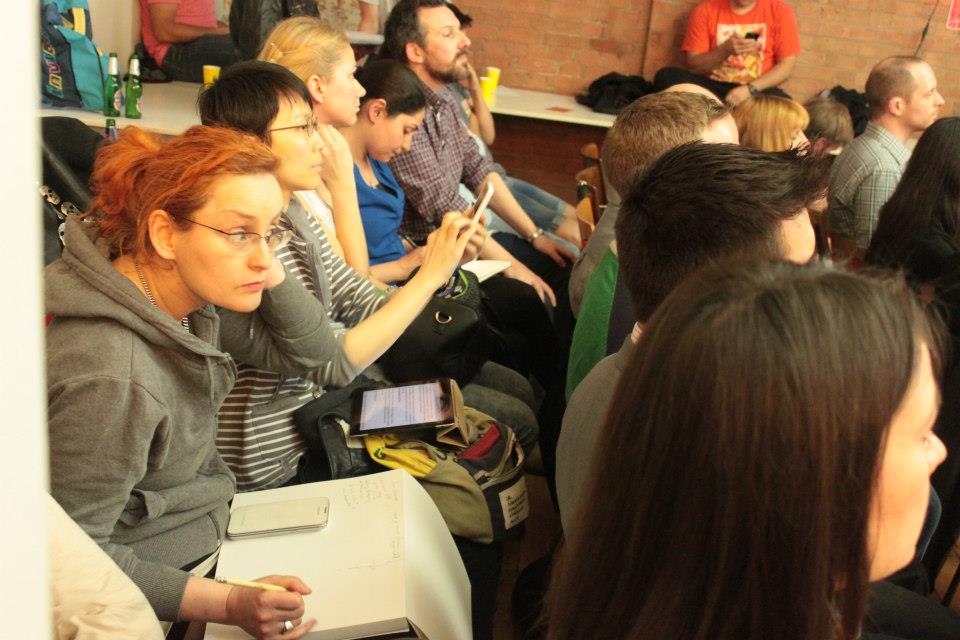 If all transactions online were done in Bitcoins, we would have visibility of those transactions via open-data Ledger available to all.
If all transactions online were done in Bitcoins, we would have visibility of those transactions via open-data Ledger available to all.
The truth of where the all money is going will allow us to take appropriate actions as a global community and consider the correct response. I for one would love a desktop application where at a touch of a button I could see where Amazon’s money (profit from my transaction) is flowing to today – is it Panama, Belize or still Luxembourg? We could add infographics and make our own diagrams of the tax evasion paths like watching flocks of birds whizzing past on their way to warmer climes.
Amir also spoke about a new ecology and considering one’s environmental actions with the concept of the same individual ‘ledger’ of our interacting with our environment. That would totally increase people’s awareness of how much mess they generate and how one-sided our interaction with the immediate environment is.
Pablo Martin, from the Catalonia post-capitalist project briefly introduced his project which seeks to produce a collective of people living through a Bitcoin framework as part of a post-capitalist model of exchange.
The cooperative is legal and is part of a network that crosses the whole country. Calafou, in Catalonia, has acquired a disused factory in the mountains. To allow a new way of self-organisation in the environment where the State is weak and can not provide a satisfactory framework for its citizens.
The unemployment in Spain is now over 30 % with the youth reaching 50%, so it is the role and duty of the older generation to help the young ones to self-organise and be self-sufficient in the times of State crisis. Pablo looks like an elder statesmen and has a look in his eyes that tells me he has seen more than your average hacker. His commitment to finding better bottom-up ways to get the Spanish youth out of the current hole is deep and the Bitcoin framework is a stepping stone in their pilgrimage to a post-State future. A few evenings earlier we had shared a great organic dinner with Pablo, Amir and their collective. I have to say the cooking was top notch and the use of a vegetable stand doubling as a stand for a projector during presentation was a cutting edge minimalist interior design element that I am keen to introduce to Cybersalon! They have their hearts in the right place and seem grounded. We feel Bitcoin is in good hands, whatever the future will bring to their mission.
Yvonne de Rosa- photographer and activist, part of the Italian Five Star MoVement (MoVimento 5 Stelle, M5S)
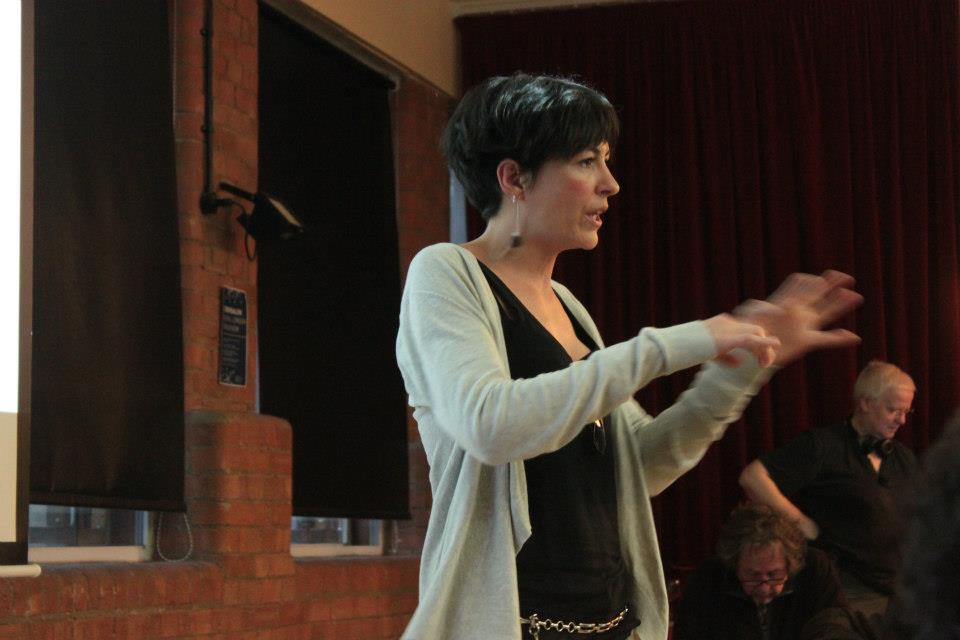 The 5Star Movement were successful in the recent Italian election, gaining 25% of new Members of Parliament using only a white van and social media!
The 5Star Movement were successful in the recent Italian election, gaining 25% of new Members of Parliament using only a white van and social media!
“We’re building a new way of doing politics. People can make their own choices, rather than following their family choices”.
Yvonne began by reiterating the contention that there is no Left or Right any more, and that in her view we are living in a post-political or post ideological world, where we are producing our own culture. She gave an overview of her work as an activist in the Five Star MoVement in Italy, which has meant entering government directly. Yvonne was an advocate of the idea of openness as a way to produce new power relations. The way Beppe Grillo (and his “Grilleni” as his supporters are called) seized the power, was simply by blogging and providing space for comments for his supporters, reaching up to 13,000 comments at some of his blogs. His tech partner is an inspired builder of communication platform (no headhunters calls please, he is staying with Beppe).
“Politics is not a career. You can’t be a M5S representative for more than two terms”.
The media scene in Italy is entirely controlled by Silvio Berlusconi and the choice of social media as strategy was clearly driven according to Yvonne by the fear that Berlusconi will misrepresent the message if they use traditional TV. It was an inspired strategy and after the election, Beppe and his Grilleni entered the established political scene by the back door, providing an argument for the urgent need for amateur politicians to replace the so called professional politicians. This rang a lot of bells with the audience as UK politics are in dire need of change of tack on the ‘politics as a profession’.
“The Internet and trust put us together. Beppe Grillo was trusted”.
Yvonne then talked about the relatively low-budget requirements for a new party and the ease of set up of the communication tools using existing platforms like Facebook, Twitter instead of AK-47s. Power is taken and not given, but 5Star Movement is a great example that the taking can be done peacefully and the power of the majority can be clearly visible on online. That is a new element in the post-newspaper world where it was not transparent how many supporters any political grouping actually has until the day of elections.
Italian social media has delivered (at least on this occasion) a new group of MPs who do not come from ‘pro-political’ background and that is a very strong message for today to anyone in Europe and the US which is dominated by dynasty politics not dissimilar to modern India.
Jamie Bartlett- Head of Centre for the Analysis of Social Media at the Demos think-tank
 Jamie also spoke about the Five Star MoVement, an organisation he has written on recently. Jamie was particularly interested in how the Five Star MoVement could impact UK politics, and how Beppe Grillo had used social media to gain the trust of people and then organise on the streets, turning his 1 million Facebook friends into more than just clicktivists.
Jamie also spoke about the Five Star MoVement, an organisation he has written on recently. Jamie was particularly interested in how the Five Star MoVement could impact UK politics, and how Beppe Grillo had used social media to gain the trust of people and then organise on the streets, turning his 1 million Facebook friends into more than just clicktivists.
“People don’t trust parties anymore. They trust each other- friends, small businesses and information they find on-line”.
He mentioned that the Internet is now statistically the most trusted way to get news information in the UK, and analysed this in terms of the fact that we do not trust our politicians and media, rather trusting friends and local connections. He spoke about this in terms of decentralised rather than hierarchical power, and suggested that our politicians in the UK needed to rebuild trust in their role and the state by using similar means to Five Star MoVement.

“We know that the better-off and the better-educated are those that will go on protests and also go on social media”.
He also mentioned that at present what you find is that those using the internet for political purposes tend to be educated middle classes, and that this is in danger of producing a new class, who would replicate the traditional class divide in political power.
Clare Solomon- the ex-president of ULU during the 2010 UK student protests and founder of Firebox, a political cafe in Kings Cross.

Clare Solomon was a leader of the Student Protests in 2010 and survived a Newsnight grilling by Jeremy Paxman in the aftermath of her demo.
She gave a Leninist interpretation of political thinking today- reading out from his manifesto.
Solomon suggested Lenin was talking about leadership and power in networks when he was writing, and so his work constitutes a helpful model from which to draw today. Gramsci, similarly, she claimed as the inventor of citizen journalism. Solomon suggested we should not shy away from the use of the word leader, but that we should ensure that all members of a movement are understood to be potential leaders.
She also mentioned that in Lenin’s time, if members of the group could not read, he would read to them, and that this could also be a useful strategy regarding the development of technological literacy. Solomon runs a ‘Festival of Dangerous Ideas’ which we were all warmly invited to participate. She gave a very passionate speech and is clearly highly versed in the use of social media in organising, reflecting and formulating programs contexts.
“Left-wing organisations are dissolving towards new organisations. However 7m people in the UK in a recent survey identified themselves as Left. How do we reach these people?”
For Solomon, the answer was clearly social media, with her Firebox café in Kings Cross providing a real-world venue for meeting, organising and debate.
Paolo (the Chair) described her political practice as ‘old wine in a new bottle’ a description with which she is quite happy. The Left and Right divisions appear to be still very appropriate to her and she considers her framework to fit today’s political environment.
Chaired Questions to the Panel
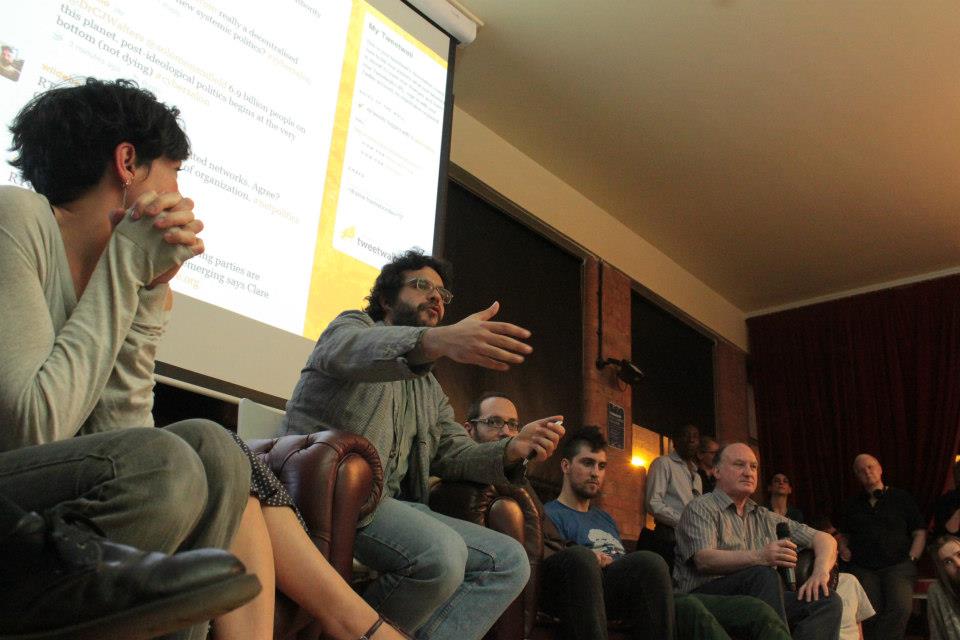
Paolo picked out some key themes which had been recurrent within the talks to expand upon in the discussion. This included exploring the idea of decentralised power and post-ideology.
Paolo asked: is it true that centralisation does not matter at all, or do we need centres of sorts? Is Bitcoin a decentralised politics?
Amir makes the point that decentralisation does not mean homogeneity, but rather that it is about individuality and allows good people to do good things. A new speaker (Michael Parsons), an ex-banker, gave a clear overview of the potential usefulness of Bitcoin as a non-capitalist model of exchange, which is global and decentralised, produced by the people for the people.
Paolo asks about the role of centralisation in the Five Star MoVement.
Yvonne makes the point that Five Star MoVement is working against mainstream centralised parties and in doing so they are giving control back to citizens. Amir makes the point that co-opting the infrastructure is a sensible thing to do and that there are many ways to fight. Effectiveness is garnered by looking around your current resources and making the best of them. This usually happens, he said, by sharing them and collaborating with the network- a very important part of Open Source philosophy.
Paolo asks about the role of the State and whether the notion of the State is still relevant today in a globalised post nation-state world?
Solomon goes back to Gramsci and the relationship between media, business, universities and how this controls ideology. She says that the State does need to be got rid of.
She is probably the strongest anti-State proponent as others consider the responsibility of the State today still significant, albeit exceeding the actual resources they have and thus their effectiveness.
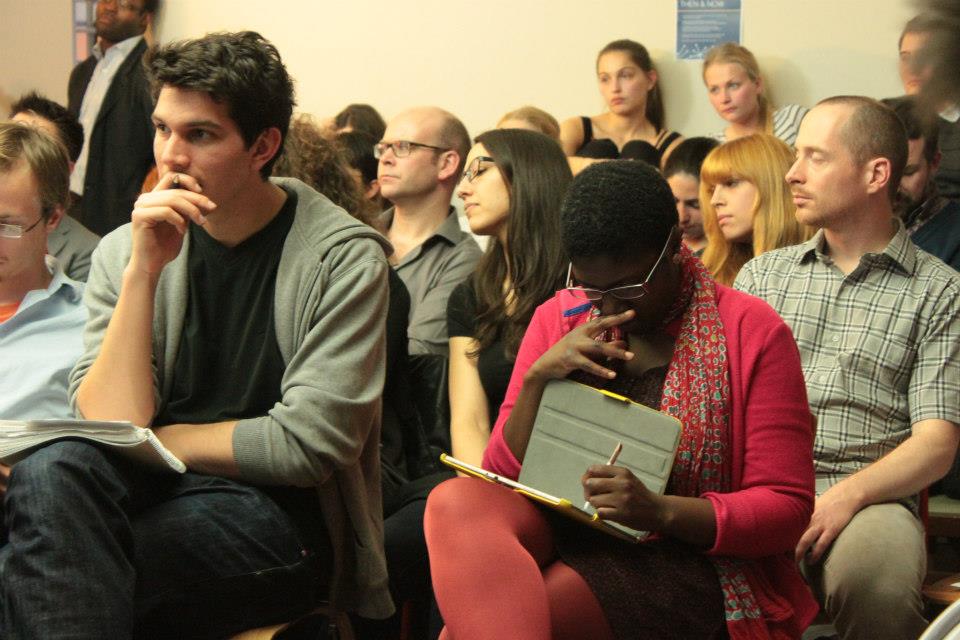
Paolo to Richard – when you were writing it was Web 1.0 – are things still the same?
Richard says it is astounding how little things have changed – the ambiguity still exists. Bitcoin can be seen as a reflection of this – it can be seen as a neoliberal tool and project, but also as a potentially radical initiative. He says the big problem now is not the state but the banks, and that the state is often working for the banks as a result of lobbyists and interest groups. Still talking about the rhizome versus the tree – nothing has changed since the 1960s. Need to think of a new system that works and is good and will sustain the Internet development for the commercial as well as social entrepreneurship.

Paolo to Jamie: UK government is centralised by almost every Prime Minister having studied PPE (Politics, Philosophy and Economics) at Oxford. How realistic is it that the UK system can be altered and decentralised?
Jamie ducks the question and says that the State is actually key and can help care for others, but has not worked as well as it needs to as it is not accountable. The UK system is not representative of the population however, and they are not trusted. Professionalization of politics is highly problematic and not what democracy is supposed to be about. Five Star MoVement is particularly interesting in this way, making politics far more representative. UK parties are in a battle for the centre – we are going into a much more chaotic movement with renegade and upstart parties.
Amir – first past the post is exclusionary – means people have to take recourse to official parties. Their values, interests and processes are just simply irrelevant in today’s global world.
Jamie – it is still possible for upstart parties in the UK – George Galloway is an example – it is just harder. It is bizarre that to wrestle the power from the government in UK one needs to be a taking a position as extreme as Galloway, there is a very big lesson in this to the current overseers of the political process!
Questions from the Audience
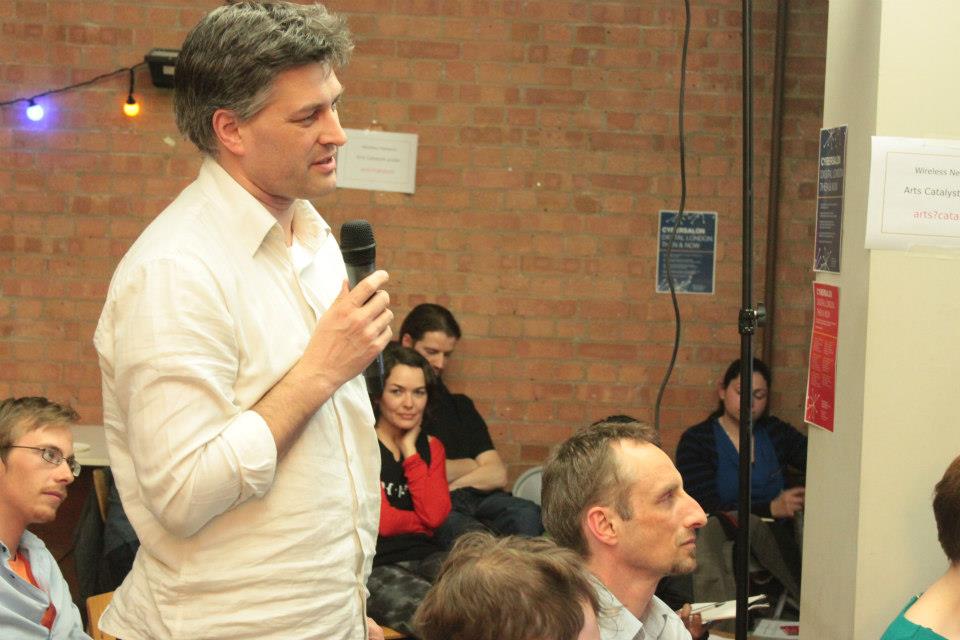
1) Nico Macdonald from the Twitter feed –
We have been talking about the tools, but what about the content?
Amir Taaki – we need new structures in place which force people to rethink their behaviour. Technologies are neutral.
Richard Barbrook- No, technology cannot be neutral! They are a battleground.
2) Is Net politics local politics and how does the local matter?
Using the internet to help provide peoples basic needs outside the capitalist system – food, housing, clothes – is what Pablo’s project is attempting to do.
2) Technocratic discussion about tools, but what is the aim? (Not answered)

3) Is the Five Star MoVement a first step towards a system capable of facilitating direct democracy?
Yvonne de Rosa – we do not do TV shows, the media does not like us because we are dangerous and outside the system. We fix a date and organise locally using social media, and then deal with locals and decide what is needed, through this the movement grows incrementally.
Jamie Bartlett- none of us know what will happen as it is still early days. The Five Star MoVement is not a lack of vision, we need to maximise the power we have over institutions and the state. The Five Star MoVement is a rebellion against the lack of control over the way politics works. It replicates ideals in a grassroots way against a closed system.
Richard Barbrook- we still don’t have annual elections – we need to re-present the word ‘citizen’ – we need to reengage with the state and put it under our control.
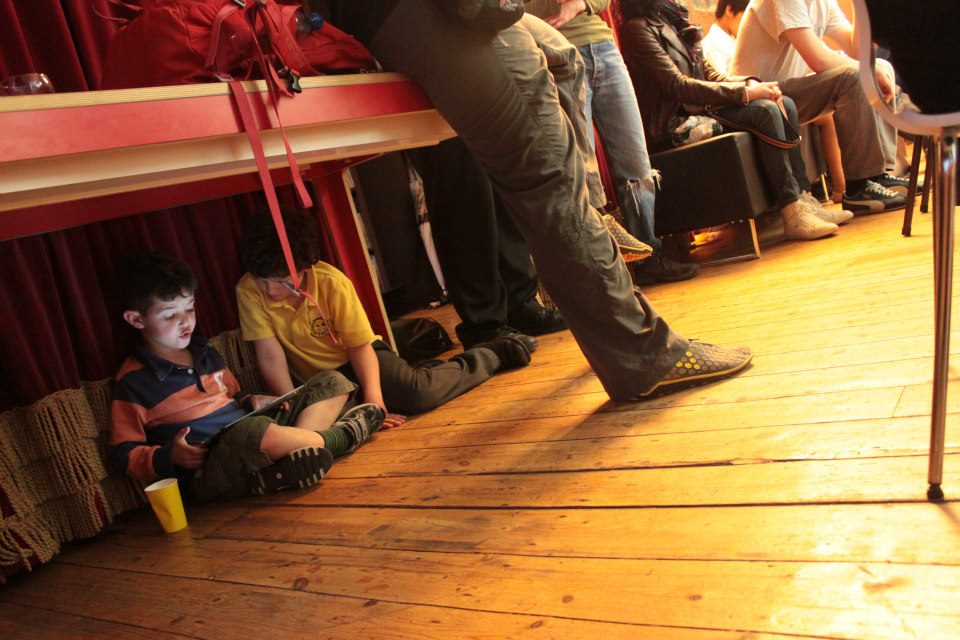 Second Round of Questions
Second Round of Questions
1) Terence McKenna said culture is an operating system – what is our agenda? What is the most valuable thing technology can bring for the future?
Amir Taaki – to globalise and localise at the same time – flows of information, but also local providers. Need free internet access to all – use that technology to develop tools for the good of the global community.
Richard Barbrook – technology will always be caught up in where people are at culturally and be used at hand to different ends.
Jamie Bartlett – access to information.
2) Has Net Politics caused the death of ideology or is it the renaissance?
Left and Right are defunct, but is this the end of ideology?
Richard Barbrook: we should be sceptical about people who think this is new.
Yvonne de Rosa – the most important thing is participation – we should not vote for a political party and just give over the power – we need to participate.
Jamie Bartlett– I agree in the meta argument of accountability – left and right as ideas about how society is organised will remain, as a fundamental human trait.
Claire Solomon: we want to live collectively, and to do this we must participate.
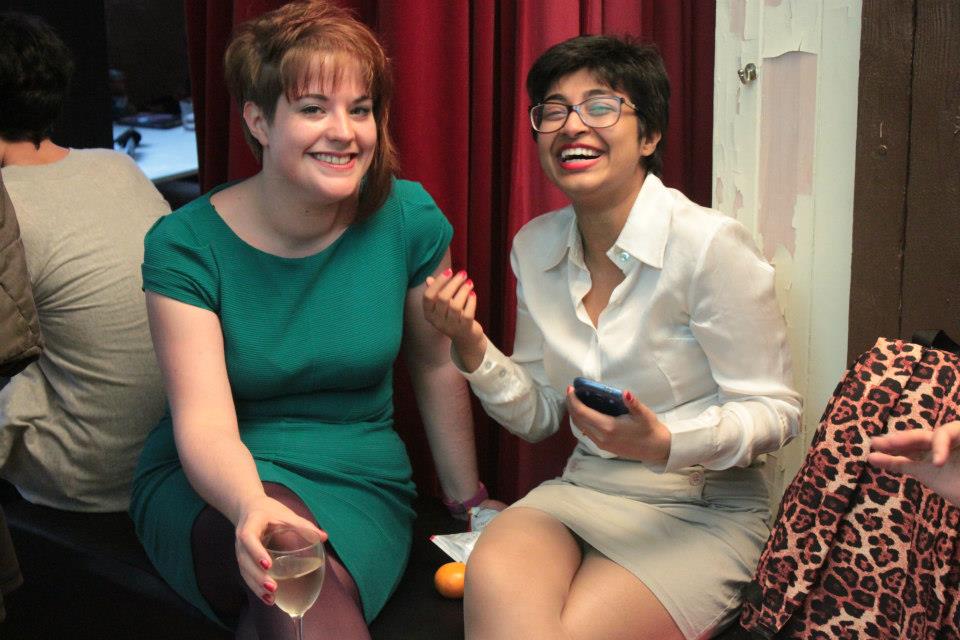 We finish with more questions than answers but with the feeling that we are granularising the arguments and developing a common vocabulary for future discussions across the most opposed political groupings. Social media gives a better framework to cross-political debate as opposed to the divisive and polarising dead-tree variety of media. We are happy to note that the Daily Mail has only 123K Likes, while Horse and House has 184K Likes. We had finished all the beer and felt that the level of conversation has reached a pub quality which is why we happily retire to the Slaughtered Lamb for further explorations of the Net Politics Then and Now.
We finish with more questions than answers but with the feeling that we are granularising the arguments and developing a common vocabulary for future discussions across the most opposed political groupings. Social media gives a better framework to cross-political debate as opposed to the divisive and polarising dead-tree variety of media. We are happy to note that the Daily Mail has only 123K Likes, while Horse and House has 184K Likes. We had finished all the beer and felt that the level of conversation has reached a pub quality which is why we happily retire to the Slaughtered Lamb for further explorations of the Net Politics Then and Now.
More pictures:
https://www.facebook.com/Cybrsalon
The Tweet Story via Storify http://sfy.co/hIYY
See you next time!
On 29th May we’ll be discussing whether interactivity can tell a good story- with digital pioneers Antirom. Book your free tickets.


